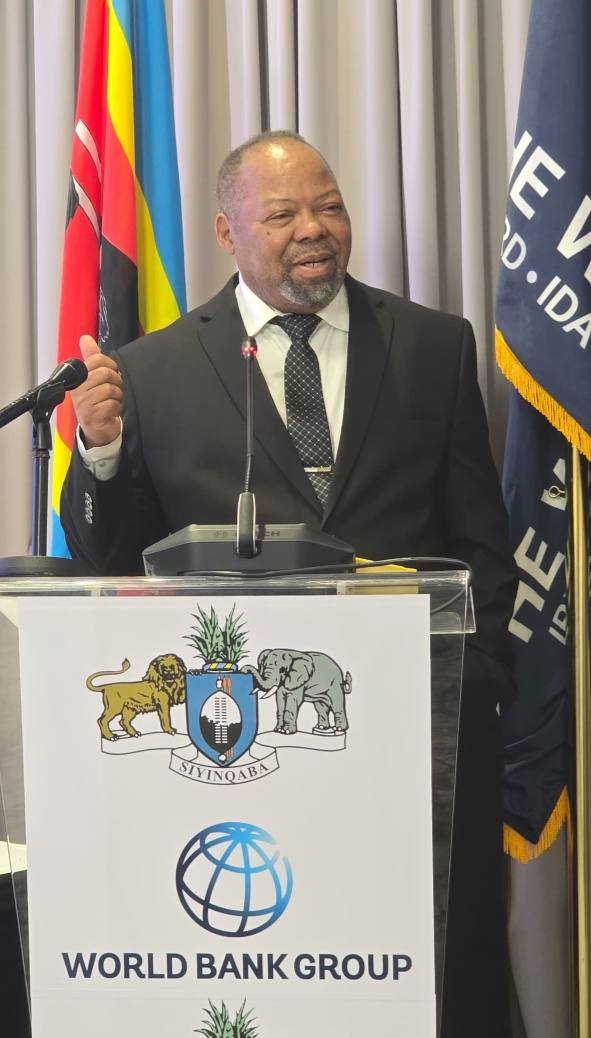By Ncaba Ntshakala
The World Bank Group’s latest publication, the Eswatini Public Finance Review (PFR): Leveraging Fiscal Adjustment for Better Development Outcomes, highlights the critical role of fiscal policy in shaping Eswatini’s development trajectory.
The report, which was recently launched by Minister of Economic Planning and Development Dr. Tambo Gina, Minister of Finance Neal Rijkenberg, Minister of Health Mduduzi Matsebula, and World Bank Country Director for Eswatini Satu Kahkonen, presents five reform pathways aimed at ensuring sustainable and inclusive economic growth.
These pathways focus on increasing revenue streams, enhancing competition and market contestability, improving expenditure efficiency, strengthening public investment management, and addressing structural challenges in the health sector.
The report highlights that Eswatini has an opportunity to make fiscal policy a key instrument for macroeconomic stability and external competitiveness, positioning the country to overcome longstanding constraints to growth and living standards.
The dynamics of economic growth in Eswatini have evolved over time. The country initially experienced strong growth, supported by prudent fiscal policies and an influx of foreign capital during South Africa’s period of international isolation before 1994.
However, recent years have seen economic expansion increasingly driven by consumption rather than investment, raising concerns about sustainability.
According to the report, this shift has made fiscal policy a critical tool for ensuring long-term stability. With expansionary policies leading to fiscal deficits and expenditure arrears, the government has taken significant steps toward fiscal consolidation since 2019.
The introduction of the Fiscal Adjustment Plan (FAP) in 2021 further reinforced this commitment.
The report emphasizes that continued fiscal discipline is necessary to boost economic growth, particularly by reducing the government’s large footprint in the economy through restructuring state-owned enterprises (SOEs), clearing arrears owed to the private sector,
RELATED: World Bank injects E3 million to revamp collapsing UNESWA through Task Team
reducing the wage premium between the public and private sectors, and fully operationalizing the Revenue Stabilization Fund established in 2023 to mitigate fluctuations in Southern African Customs Union (SACU) transfers.
The reports asserts that Eswatini is well-positioned to adopt a medium-term fiscal framework that can enhance resilience to economic shocks, enhance inclusive growth, and improve living standards.
One of the key recommendations in the report is increasing revenue streams while simultaneously promoting market competition and contestability.
Eswatini’s total revenue remains volatile and procyclical due to its heavy reliance on SACU inflows, while domestic revenue mobilization remains relatively low despite having higher tax rates than many of its peers.
To address these challenges, the report suggests improving tax administration by creating a dedicated unit within the tax service to focus on high-net-worth individuals, streamlining tax registration and payment procedures, and enhancing the financial performance of SOEs.
Strengthening SOEs would enable them to contribute more revenue, avoid accumulating tax arrears, and reduce fiscal pressures on the government.
Public financial management reforms are also central to Eswatini’s fiscal strategy. With the public sector accounting for about 30 percent of GDP, expenditure remains heavily skewed toward recurrent spending, particularly wages, while capital investment remains low.

Despite the Fiscal Adjustment Plan moderating wage spending, the government continues to grapple with persistent expenditure arrears and high transfers to SOEs.
To improve spending efficiency, the report recommends enhancing budget preparation, improving budget execution and commitment controls, eliminating arrears, reforming SOEs, and strengthening public procurement through the adoption of electronic procurement systems.
A significant development in this regard is the implementation of a new Financial Management Information System, which is expected to improve oversight and accountability in public spending.
The review also stresses the need for strengthening public investment management, particularly by integrating climate considerations into capital project planning.
While capital investment has seen moderate growth, execution rates remain below expectations.
The government has taken steps to address this by developing new Public Investment Management Guidelines to standardize the preparation and appraisal of capital projects.
By incorporating climate resilience measures into public investment strategies, Eswatini could unlock access to climate financing, providing additional resources to enhance economic resilience and infrastructure sustainability.
RELATED: World Bank hosts presentation to tackle poverty through education
Another critical area highlighted in the report is the need to address inefficiencies in Eswatini’s health sector. Although public health expenditure is relatively high compared to other lower-middle-income countries, outcomes have not been proportionate to spending levels.
While life expectancy has improved, maternal and neonatal mortality rates remain stagnant, and the country continues to struggle with a high burden of communicable diseases alongside a rising incidence of noncommunicable diseases.
To improve health outcomes, the report suggests reforms such as strengthening budget and public financial management, addressing supply chain management issues,
implementing strategic health service purchasing mechanisms, improving the availability and use of health data, and enhancing access to quality health care, particularly at the primary care level.
Eswatini’s fiscal policy remains at the center of its development strategy, with targeted reforms aimed at enhancing revenue generation, expenditure efficiency, and overall economic stability.
The Public Finance Review provides a comprehensive framework for guiding fiscal adjustments that will enable the country to address structural constraints and promote inclusive growth.


